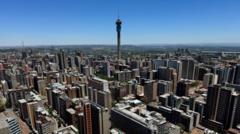Johannesburg's Ponte Tower, once a symbol of urban decay, exemplifies the city's revival. In stark contrast to its previous status as a haven for crime in the 1980s, the building has become a residential hub since the FIFA World Cup, now nearly 75% occupied. Despite persistent issues like crime and emerging water crises, initiatives by organizations such as Ithemba and JoziMyJozi aim to beautify and revitalize the city. Jewel City, one of the new developments, showcases the growing demand for urban living, with plans to double its property leases in the coming years. As Johannesburg prepares for the G20, community leaders express optimism that their city can rise to become the gold standard for urban centers in Africa.
Reviving Johannesburg: From Crime Scene to Urban Phoenix

Reviving Johannesburg: From Crime Scene to Urban Phoenix
Johannesburg undergoes a remarkable transformation, moving from a crime-ridden past to a city of hope and renewal.
In the heart of Johannesburg, Ponte Tower represents both struggle and hope for the city. Originally erected in 1975 and holding the title of Africa's tallest residential building, Ponte Tower fell victim to a crime epidemic during the 1980s, becoming notorious for its dire living conditions. Delight Sithole, a guide for tours, recounts the grim history when the building lacked basic utilities, leading residents to dispose of waste in its hollowed core. It was a time marked by fear and violence, leaving a deep stigma around the once-coveted location.
The winds of change began to blow in the mid-2000s, particularly following the FIFA World Cup. More residents began returning, and now, the tower is experiencing a positive resurgence—once a site of despair, it is morphing into a symbol of community renewal, with 75% of its apartments now occupied again. However, the larger city still grapples with challenges, including high crime rates and a looming water crisis exacerbated by past power cuts.
Ithemba, a progressive property developer, is at the forefront of this revitalization effort. Their project, Jewel City, is characterized by a blend of modern living and historical significance, showcasing the area’s past as a diamond trade center. With plans to collateralize their success and double their leased properties in two years, the company sees pent-up demand for city living in the urban core. Nearby, community initiatives led by JoziMyJozi address practical issues—lighting city spaces that have long been dark due to electricity shortages, cleaning major entrances, and revamping the urban landscape for all residents.
JoziMyJozi's CEO, Bea Swanepoel, emphasizes her organization’s vision: to revive hope for Johannesburg’s citizens through tangible improvements in safety and aesthetics. With a broader goal of showcasing Johannesburg as an attractive destination for business and tourism, the organization aims to challenge perceptions about the city and set a new standard for urban development in Africa.
As the city gears up to host the G20 summit, community members like Sifiso Zikhali from Dlala Nje believe that their efforts will bear fruit. He reflects on their journey: “This is our city, and whatever we face, we need at the end to find a solution for it.” The hope is that continued investments and grassroots movements can ultimately shift global perceptions, placing Johannesburg alongside the world's major cities.
The winds of change began to blow in the mid-2000s, particularly following the FIFA World Cup. More residents began returning, and now, the tower is experiencing a positive resurgence—once a site of despair, it is morphing into a symbol of community renewal, with 75% of its apartments now occupied again. However, the larger city still grapples with challenges, including high crime rates and a looming water crisis exacerbated by past power cuts.
Ithemba, a progressive property developer, is at the forefront of this revitalization effort. Their project, Jewel City, is characterized by a blend of modern living and historical significance, showcasing the area’s past as a diamond trade center. With plans to collateralize their success and double their leased properties in two years, the company sees pent-up demand for city living in the urban core. Nearby, community initiatives led by JoziMyJozi address practical issues—lighting city spaces that have long been dark due to electricity shortages, cleaning major entrances, and revamping the urban landscape for all residents.
JoziMyJozi's CEO, Bea Swanepoel, emphasizes her organization’s vision: to revive hope for Johannesburg’s citizens through tangible improvements in safety and aesthetics. With a broader goal of showcasing Johannesburg as an attractive destination for business and tourism, the organization aims to challenge perceptions about the city and set a new standard for urban development in Africa.
As the city gears up to host the G20 summit, community members like Sifiso Zikhali from Dlala Nje believe that their efforts will bear fruit. He reflects on their journey: “This is our city, and whatever we face, we need at the end to find a solution for it.” The hope is that continued investments and grassroots movements can ultimately shift global perceptions, placing Johannesburg alongside the world's major cities.























